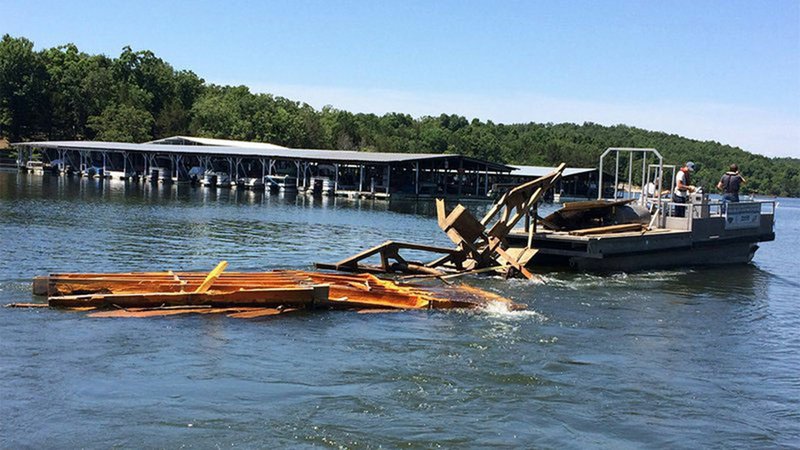Staff from the Arkansas Game and Fish Commission and the U.S. Army Corps of Engineers teamed up to remove debris left from spring floods that created hazardous conditions for boaters this summer on Norfork Lake.
Floods devastated many areas within floodplains in northern Arkansas and southern Missouri from April 28 to April 30. Roads, bridges and buildings were swept away and crushed under the force of current spawned from up to 12 inches of rain in less than two days.
Water levels and dangerous conditions eventually subsided, but the debris may take years to completely remove.
One of the hardest hit areas was the North Fork River in Missouri, which flows into Norfork Lake. Flooding destroyed cabins and houses, overtopped bridges and swept away trees. During the flood, Norfork rose more than 11 feet in 24 hours.
Citizens began voicing concern, especially on social media, about the impacts of the flooding on the lake and local economies. Game and Fish fisheries biologists from the Mountain Home office joined with the local Army Corps of Engineers office to help clean up.
"Both agencies recognize the importance of Norfork Lake to local economies," said Jeremy Risley, Game and Fish fisheries supervisor. "We wanted to assist in the cleanup efforts. We had the equipment to tackle the large items around the lake that others couldn't pick up."
Biologists modified habitat barges, which are special pontoon boats rigged to place trees and other aquatic habitat into the water. They added a pulley system to tow large items or winch them into support boats.
"We focused on heavy man-made items or items that had metal or wires attached," Risley said. "We removed whole roofs, floors and walls of buildings. We picked up hot water heaters and furniture."
Risley said the focus on man-made items was largely because of the danger of sharp, metal objects being left loose in the water. One worker suffered severe lacerations during the cleanup, he said.
"If that had been a boater, skier or someone else who was out on the lake for a day of fun, it could have been much worse," Risley said.
Sports on 08/15/2017

